#<- also game canon but it's not explicitly shown
Explore tagged Tumblr posts
Note
I kove you've described redacted as apathetic and pessimistic but is he or 'ren' at all sadistic in any way? and what would you define ren's 'breed' of yandere? (loving your work so far, have a wonderful Febuary!)
✦゜ANSWERED: Ren is just a sane and normal guy >:3
I wouldn't say that Ren/[REDACTED] is really "sadistic" or anything!! It's mainly because they literally don’t feel anything when killing/torturing their victims — nor would he ever want to harm Angel in any capacity.
Any feelings [REDACTED] might have are exclusively tied to Angel (feeling happy when he finally has them all to himself, relieved when there's no more competition around, adrenaline whenever Angel gets too close to bringing up one of his past victims, etc.), though none of them are sadistic, dark, or "impure".
Obviously, he isn't aware that his twisted, obsessive needs and co-dependent feelings can easily fall into those categories though... ^^; Ren genuinely believes that his devotion and feelings towards Angel are pure, harmless, and without a scintilla of toxicity, corruption, or tainted behaviour.
But as for what kind of yandere Ren/[REDACTED] is; I honestly don’t have a clue, and I don’t really want to limit him to a specific label or stereotype!! >.<; All I know is that Ren is the type to put Angel above everything else — even himself. He’s willing to change aspects of his appearance and personality, glitch out his entire world and everyone in it, and mess with everything else in order to appease Angel and keep them happy. He won’t ever harm them or show his violent tendencies out of fear of how they’d perceive him, and he'll only show sides of himself that he knows they'll respond positively to.
Ren is also "two-faced" in the sense that he's kind and empathetic with Angel, but detrimental and antagonistic towards everyone else. He has no attachments or affiliations with anyone other than the object of his affections, which means he's willing to harm anyone — even his best friend — without any remorse or empathy.
So take that however you'd like!! I'm not sure if it helps in any way, but again, I don't really want to put a label on Ren (outside of calling him a "yandere").
#💌 — answered.#💖 — about ren.#💖 — 14 days with queue.#💜 — blog canon.#<- also game canon but it's not explicitly shown
498 notes
·
View notes
Text
The Veil and the Ad Hominem Fallacy
While there are many things I love about Veilguard, the way the Veil was dealt with was definitely a weak point. We know the devs were worried that people sympathized too much with Solas' goals; hence the choice to have him kill Varric. But I think this demonstrates a misunderstanding of the reasons why people liked and sympathized with Solas.
In previous games, we were shown that the Veil has consistently harmed spirits, mages, and (arguably) elves - three groups who are systematically oppressed and/or have their personhood erased in Thedas. And in Inquisition, Solas was the only person who stood up for spirits, and among one of the most vocal supporters of mage freedom; he was also (albeit inconsistently) critical of the ways elves have been treated throughout Thedosian history. So people who sympathized with those three groups were naturally inclined to have at least some sympathy both for him personally and for his plans regarding the Veil (of course pending further details, since Trespasser was pretty vague about this). It's not the case that people agreed with him blindly because they liked him or because they romanced him; they liked him because they agreed with him, at least about the harms the Veil was inflicting on vulnerable groups. The use of Cyrian as a metaphor is also telling here. Anaris is clearly intended a parody of Solas, and so the mask which makes Cyrian feels Anaris' emotions seems to be intended as a critique of people who sympathize with ancient elven gods due to empathizing too much with them. But again, this is a misunderstanding. People didn't sympathize with Solas' goals just because they think he's tragic, they sympathized for actual reasons based on the canonical evidence for the Veil doing harm.
Having Solas kill Varric was therefore not a good way of addressing this issue, because Solas' personal character and methods are completely irrelevant to the question of whether the Veil should come down or not. The same goes for showing that Solas is largely motivated by regret, or that he often gets his plans wrong - all of this is a classic ad hominem fallacy. Perhaps these things might serve to convince us that it is not a good idea for Solas to take down the Veil by himself, but none of it is relevant to the question of whether the Veil should in fact come down.
The right way to address this issue would have been to actually address the arguments for it! Allow Solas to articulate the fact that the Veil harms spirits, mages and (perhaps) elves. Allow him to tell us what he believes Thedas would look like after the Veil came down. Allow Rook to discuss Solas' claims with knowledgeable people like Emmrich and Morrigan, and assess their validity. Perhaps even allow Rook to talk with the Mourn Watch, the Veil Jumpers and so on about other possible ways to mitigate the harms that the Veil does. Give Rook a chance to convince Solas himself that there are other options!
I'm not saying that the Veil should have come down. There's no canonical answer to the question of whether that would have been a good outcome, since we got no concrete details at all on what Thedas might look like if it did. Nor do I necessarily think that would have been a better story. But I do think the game we actually got would have been strengthened if they'd trusted players a bit more and allowed us to explicitly contemplate the morality of the Veil, and to seek alternative ways of solving the problems it causes.
234 notes
·
View notes
Text
Bra Shopping with fem!Shigaraki
half head canon // half x reader type story not really sexual but it does contain photos of bras + the whole thing is about boobs so might not be sfw or appropriate for everyone; not setting an age limit to read it since we all know what bodies are just use your own discretion

While I absolutely love the head canon she'd have cute little A cups, I think that would only be true for blue-haired-staying-in-playing -video-games-and-plotting-instead-of-consistently-eating-anything-with-nutritional-value Tomura.
As soon as she starts training and eating consistently, genetics would kick in and I mean:


While I don't think anyone would have stopped her from buying bras, I also don't see Kurogiri having the best advice on how to look for anything of that nature. Especially if she hasn't shown a need for it.
And, sure, you absolutely noticed that she filled out, but you weren't about to tell your girlfriend what she should be wearing. That is, until the complaints rolled in:
"Why do they bounce so much? Are they supposed to be like this?" Tomura grumbles after a mission.
"Like what?" you ask.
Tomura stares down at herself, concerned, while wiggling back and forth. You almost laugh.
"Yeah, that–that's normal."
"Oh," she mumbles. "Well, how do I make them stop hurting when I jump?"
That's when you decide it's time to go bra shopping. You pick a place with a lot of options. Conveniently, they also do fittings. Tomura is nervous through the process. You ask if she assumed bra-fitting would be some sort of laser scanner that creates a 3d model of you that spits all of your sizes out; she doesn't answer. Instead of expensive technology, the grey haired woman with a length of tape works her magic and it's over before Tomura can even complain about having to stay still for so long.
"32D. Look for the blue tags," the woman says before walking away.
Tomura looks down at herself wide eyed and cheeks flushing before glancing back at you for validation.
"Yeah, that sounds right," you reassure her. "You did have a pretty big growth spurt. Come on, let's look around."
Initially, you thought she would pick the first simple black thing she found and go with that. That's how she usually shops. However, Tomura has seen cute bras before and wants to feel pretty. She's not explicitly saying that, but her selections reflect it, in their own way. They also let you know: she has no idea what she's looking for. So, she ends up with a completely random assortment of things on her first trip into the fitting room.

"Do you need any help?" you ask from outside the curtain. There's a long pause before she answers. "Uh, I don't think this fits right."
"Can I see?" you ask.
Tentatively, she pulls the curtain back, giving you a peak at what she tried on. Well, tried to try on.
"Uhm," you say politely while trying to find the right words, "I think your arms go through this strap?"
"Oh," she mumbles, "uh, I don't think this one is going to work for me. Or this one," she hands you another strappy black bra, "I liked it on the mannequin but now it's kind of scary."
"That's reasonable," you say. She hands you another.
"And this one. I don't like the," she gestures under her boobs, "the hard part?"
"Underwire?" you ask.
"Yeah, that part. I don't like it."
"Okay." You hang them both on the rack behind you, "fortunately it sounds like you're just looking for a little support most of the time?"
"Most of the time. Maybe more on missions. And," her cheeks turn a deeper shade of pink as she nervously scratches her neck. "And it might be fun to look cute sometimes?"
"You're always cute."
"You know what I mean, y/n."
"Yeah, I know what you mean. Why don't you try on that last one while I find you a few more?"
Knowing vaguely what she's looking for, you grab a few more. A sports bra for her missions, two more comfortable options, and another that looks comfy but cute.

When you come back, Tomura has unsuccessfully crammed herself into the last of her selections. It was her size, however, the fit isn't quite right for her anatomy. The result of that is the majority of her spilling out over the top of the cup.
"I don't think this is doing much," she says while poking at the sides of her boobs.
"I don't think that's what it was designed for. Try these."
She does.
Fortunately, all of your selections fit her well. With a little reassuring that you do, in fact, find her cute in them even if they aren't covered in too many straps and other things that scare her, she decides to buy them all.
Now, Japan gets to see her as the symbol of fear – but only you know she's wearing a lacy red bralette under her villain clothes.

[bnha masterlist]
taglist: @kitkat13001 @kennys-partner @amira-44820 @its-evee16 @thesecond2demonking
@shigarakislaughter @dance-with-me-in-hell @minniessskii @vaval3ntin @ykyouluvme
@dummi666 @lotus-flower420 @nonominchan @softnfuzzy @mysticalhills
@reireitaka @crwavee @baby-pink-flowers @drlucichen @frieren-imposter
@lou-the-naga-queen @multifandomidk @love-for-yoosung-kim @xytraxpy @venom-barf
@shiiigaraki @thetinas21 @spam-1
#I think eventually she'd grow more muscle and end up like a 34C#wrote this on a whim and decided to share it#happy pride#or something#fem shigaraki#shigaraki x reader#shigaraki x you#shigaraki tomura x reader#fem shigaraki x reader#fem!shigaraki#tomura shigaraki x reader#tomura x reader#my hero academia#bnha#bnha x reader#my hero academia x reader
90 notes
·
View notes
Text
Looking at the Dick Grayson Crashout of All Time™️
Finished the rest of Batman: War Games to get y’all the Dick Grayson Crashout panels. I would like to state, however, that the crashout was the only part of this three-parter that I truly enjoyed. War Games was otherwise iffy. Not a huge fan of how much of an asshole everyone is — particularly Bruce — throughout. That’s not the point though.
For context, Batman: War Games takes place right around issues 90-100ish of Nightwing. Blockbuster is dead, but only has been for a week or two. Everything surrounding that plot line has also occurred.
Anyways, the first two panels with Nightwing unironically start with him seeing Batman and immediately going into guilt mode. As I stated in a previous post, this man is so thoroughly fucked that the Bat-guy with the emotional intelligence of a sponge during the midst of a gang war still asks if he’s okay.


The next time we see him, it’s been a while and he’s traveling in the car with Bruce to resolve some issue. Again, keep in mind that this is the VERY NEXT TIME we see Dick. Every time he is shown to look at Batman, he is consumed by his guilt. He cannot look at Bruce.
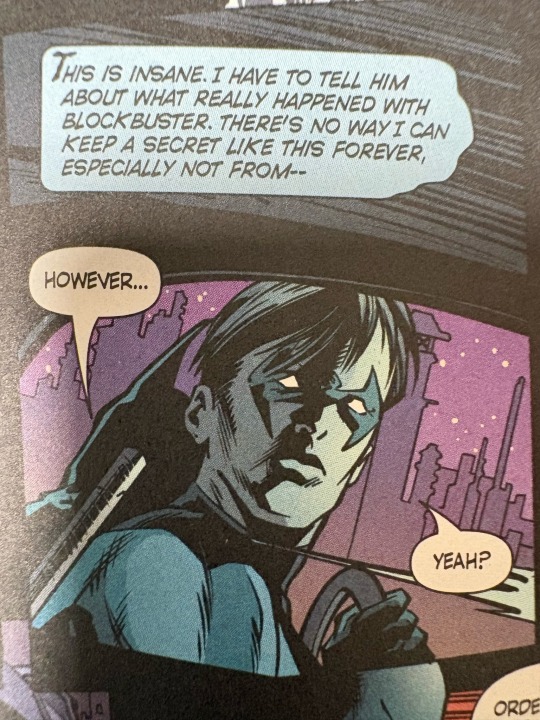
But, okay, fine.
It doesn’t really get bad until the next time Dick’s on-screen, where he regroups with Tim to fight off some other gang members.



He gets into his first major fight of the comic, and flips the fuck out immediately under the assumption that Tim is dead. This is probably lingering trauma from the explosions of Haley’s Circus and his apartment — both of which only happened weeks ago and both of which killed numerous people.
Dick is now unable to even be exposed to the fire and flames without losing his shit. Which would be understandable for a civilian, but Dick has been in similar situations for over a decade at this point. His poise built from over half a lifetime of crime-fighting is just gone.
And Tim is like “what the fuck is up with you man??”

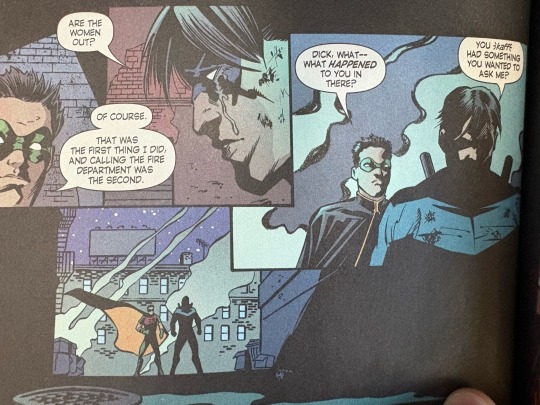

This is legitimately heartbreaking. Dick cannot stop crying at fucking everything. Tim came to seek emotional support from his big bro and has to switch on a dime to become the comfort guy because Dick is just not there. And the last panel? Where Dick whispers that Bruce will forgive Tim, but it’s fucking clear that he’s trying to convince himself??? Christ man.
In this final bit, where he’s reflecting on his tenure as a vigilante… it’s so sad.
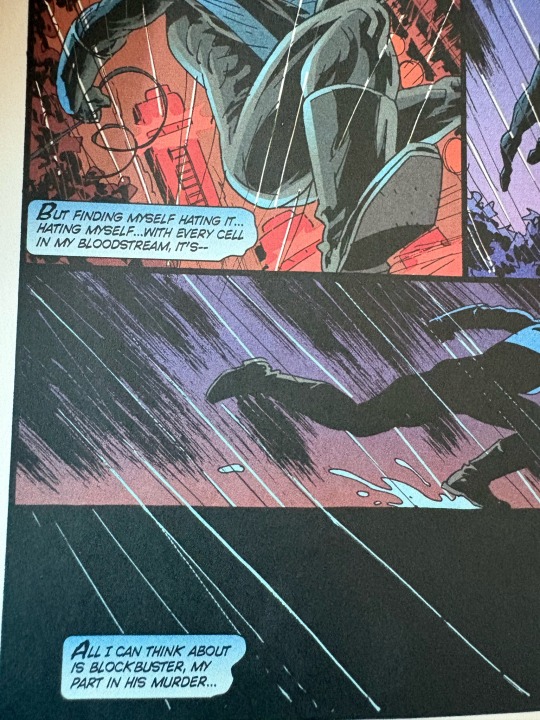
I cannot think of the last time I’ve read a comic book character express “I hate myself” so explicitly. Not that it hasn’t happened, but like… Nightwing really wants to die. I have never seen the word “drowning” so perfectly represent the state of a person before.
I think the worst part is that there’s no resolution, because he gets shot by the GCPD after and is gone for the remainder of the comic.
When I said Blockbuster and Tarantula ruined this man, I mean they ruined this man. I wasn’t expecting this at all when I started this series, and now I’m stunned more members of the community haven’t picked up on it.
Anyways, enjoy the angst. I’m gonna wrap up my N52 volume and get started on Forever Evil so I can read the Grayson run (and maybe collect some screenshots of the bomb scene to see the canon events if anyone wants them).
#dick grayson#richard grayson#batman#dcu#nightwing#dc comics#batfamily#batfam#comics#batman comics#batman war games#Tim be like:#that face when you go to your emotional support brother for comfort but he’s on his *trauma arc*
91 notes
·
View notes
Text
LGBTQ+ Disabled Characters Showdown Finals


Please be civil in the notes. We will block people if we feel it is necessary. A character being canon LGBTQ+ and disabled was not required to be in this competition. Please check qualifications and propaganda before asking why a character is included. This is not a competition of who is better representation.
Check out the battle for fourth place here.
This is a two vs. one poll because Neil Josten and Andrew Minyard tied (by our standards) back in round 4 and moved on together.
Yang Xiao Long-RWBY
Qualifications:
She is canonically wlw (has been for years but specifically kissed and got together with her now girlfriend in the latest season) and uses a prosthetic arm and has been shown to struggle with PTSD due to the traumatic nature of losing it during the show.
Canonically had her right arm chopped off, uses a prosthetic. Has PTSD. Is canonically in a WLW relationship.
She has a canon girlfriend and canonically has a prosthetic arm and PTSD
She's canonically sapphic (part of a recently canonised wlw slowburn relationship) and is an amputee (due to events from the 3rd season finale) who wears a robotic prosthetic. She also suffers from PTSD which is explored in the show
Propaganda:
I will keep on submitting Yang to relevant brackets until I die. RWBY has plenty of strengths and weaknesses with writing, especially Yang's recovery arc, but instead of forcing her to push past her trauma and enter the battlefield immediately, we see her struggle with it, take time to process, and not be pushed into repression and when she chooses to wear her prosthetic, chooses to train to ready herself, and chooses to seek out her family and save lives, she isn't perfectly healed, as no one is. The show depicts her having flashbacks due to sudden loud noise, shaking hand the first few times she has to fight for her safety instead of training with her dad, and snapping at friends when they bring up Blake, the person she lost her arm trying to save (who, near immediately after ran away due to feeling she was endangering those she loved, furthering Yang's already present abandonment issues.) It isn't done perfectly but the intentions and general message sent are extremely positive and honest. She struggles less as the show progresses, and there are opportunities to consider herself less for being disabled or "become whole again" but she explicitly refutes these ideas and says that's she's better because of her failures and losses, and isn't any less whole. Her becoming disabled is also extremely tied to her being LGBT, because, as previously mentioned, she lost her arm protecting her then friend and partner, now girlfriend, directly after the villain who cut her arm off told her love interest that he would "destroy everything [she] love[s]. (Camera pans to Yang, he looks at her.) Starting with her." LIKE. He attacked her BECAUSE Blake cared for her so much and Yang ran to her defense blindly BECAUSE she loved Blake so much. When they reunite, they struggle with communication because Yang feels Blake is seeing her as weak, and through several things, mostly a climatic battle against the man who severed Yang's arm, they affirm each other as equals. I can go on but this is already too long. YANG SWEEP!!!!!
Yang lost her arm while protecting her best friend and future girlfriend from said girlfriend's abusive ex. Had a whole arc about learning to live with that loss and dealing with PTSD. Is totally devoted to and in love with Blake Belladonna and is just the sweetest but most badass character in the show.
She's one of the main characters, and just finished a 10 year slow burn romance. Plus, she has both physical and mental disabilities, but is never treated as lesser or incomplete.
Yang Xiao Long was one of the first examples of a sapphic character I ever saw in animated media with her character journey in the show being an iconic part of my teenage years and current young adulthood. The loss of her arm after a traumatic event in the show's 3rd volume was one of the big shockers of the show that nobody saw coming. Since then the show has done an amazing job in exploring both the mental and physical effects of her losing a limb, gaining a prosthetic arm and the recovery journey. Her character also has a major arc regarding handling her PTSD from both this and her past most notably in the 5th and 6th volume. Her character also has a slow-burn romance with her teammate and fellow main character Blake Belladonna which is one of my fave romances ever (it has everything: canon soulmates, friends to lovers, sunshine x grump,battle couple etc..) that has recently became CANON BABIEE!!! There are MULTIPLE characters in RWBY with various disabilities that are handled well in the narrative but i would say Yangs definitely the top FAVE!
Neil Josten-All For The Game
Qualifications:
I mean he def has PTSD even though it's never like fully fleshed out in the series and also he is demisexual
Propaganda:
Neil goes through so much it's amazing he is still functioning as a person. He bottles up all of his trauma but he still has nightmares and triggers that bring back the trauma he felt from his abusive mafia father and his abusive mother. However, once he lands at PSU to play D1 Exy, he finds a home with all of his other broken teammates and coach. This includes Andrew Minyard, another possible contender for this bracket. While he still has trauma to deal with, he becomes a much more well adjusted and happy person with his teammates. :)
Andrew Minyard-All For The Game
Qualifications:
He’s gay and has some sort of trauma disorder probably.
More about that here.
Propaganda:
Very gay, pretty commonly thought of to have some sort of trauma disorder, he’s neat. I have many thoughts about him as a character but I don’t really feel like writing them.
#polls#poll#disability#disabled characters#lgbtq#lgbtq characters#id in alt text#lgbtq dcs final#yang xiao long#rwby#neil josten#andrew minyard#all for the game#aftg
136 notes
·
View notes
Text
people mischaracterizing penny out of all characters in pokemon scarvio definitly played the game in ancient greek with their eyes closed. like she's one of the characters with the most explicit story and personality in game. like no roger, this isn't an evil manipulative criminal, this is a socially awkward teenage girl who faced bullying and tried to stand up against it with the help of her friends, who were also bullied kids. when it went too far, she immediately regretted it and tried to make things better by dismantling the group she had formed and take accountability for her actions (she's literally, genuinely shocked when she's not offered more severe punishement for it).
like, all of this are canon infos. written and shown clearly in the game. penny's personality and development isn't as subtle as other characters like nemona or carmine. everything is written down explicitly, so i really have no idea where some people get their insane takes from 💀
#pokemon#pokemon scarvio#pokemon scarlet and violet#pokemon penny#penny pokemon#bit of a rant#i just saw an anti-penny post that made me crash out a bit like#like i have no idea how one can be so angry about something so wrong lol#just say you haven't played the game bruh#it's kinda funny though
78 notes
·
View notes
Note
Crazy that what's already done to the Heathcliff in the book is done to this Heatchliff like people... it's been 2 centuries and you haven't learned anythingggg
literally... it's not like they're like. hyperspecific racist stereotypes that nobody could've ever guessed were offensive. it's like how people are fucking obsessed with the "dogboy" thing and they turned it into a quirky thing to call him on their stupid fucking hindley and linton rp accounts* even when in the game canon this is explicitly shown to be racially charged abuse. the hygiene "joke" picking up is actually making me feel crazy it's genuinely the most common bit of anti-romanism ever- and like u said, also literally brought up in the book, where it is textually tied to the feeling of being othered, so making it into a joke requires like several layers of ignoring the text. that is if assuming a genuinely worrying level of ignorance instead of malice.
* (or in their ship stuff lol. the gredgar content is the first one that pops into my mind because christ it was bad, but i've seen it for pretty much any hc ship, including the one i like. there's a reason i don't like reading stuff other people write for them 👍)
answering other anon too since i'm here-
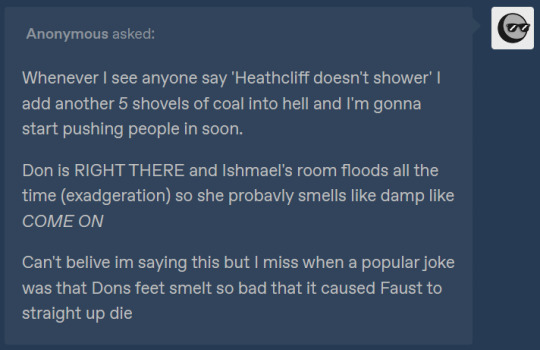
HONESTLY SDFTYGHJDNFSK like on a lighter note from the first answer, if we really wanna talk headcanons like, many branches of my family are fishermen and like truly when you spend most of your life on the sea... Yeah. yeah... bloodfiends too are explicitly said to smell like blood, so like...
and then back to the topic- besides this being blatantly racist it is also deeply out of character. not implying that videogame interpretation is the important thing in here, or that it'd be justified if it was in the canon, but like i do think it's relevant that this is genuinely out of fucking nowhere, there is nothing in the text that even hints at this uh, "stinky dog" bullshit people love to make posts about, and in fact we see repeatedly it's the opposite.
heathcliff is deeply insecure about his appearance and the way other people see him, which is something he's always hyperaware of. hes got no money and also hes in the lcb now, and the sinners dont really have a choice in what to wear, and he doesnt know how to dress up specifically because he was excluded from that world. despite that he still dressed remarkably well compared to backstreets residents (dead rabbits meur id story), has an eye for high quality things (c6 start, the scene with the man in the red hat) and he doesnt exactly like that he has to wear for work (also c6, "I'm not going there in these wrinkly old rags"). this is way more thought put into personal care than most of the other sinners, and yet hes the one getting these types of "jokes"? you know why lol.
anyway. mermaid perfume really cute.
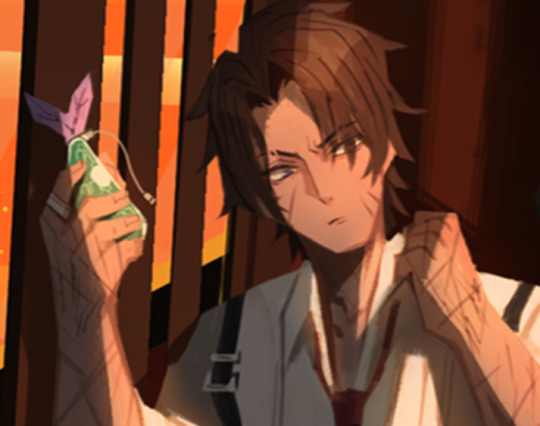
#edited 2 correct a term. sorry about that#ask the bell#limbus company#heathcliff lcb#i just recently saw that the famous twitter girl who went on a tirade about how its ok to whitewash him is active again#so ive got a short fuse now. kill everyone
66 notes
·
View notes
Note
So with Ep 10 out what are your thoughts and opinions?
Ep 10 might be the best beast yeast ep ever baring ep 8, I actually can't decide which is my no 1 as they're both absolutely fantastic. Warning: ep10-11 spoilers, the post got way too long so I'm putting undercut, there's also ship talk which um, yup, abandon hope ye who enter:
About ships:
I'm putting this first to get it out of the way... It's canon, it's actually canon guys no more denying it alright. BxA fans keep on winning as always, some joke about it but I seriously won't be surprised if salt does straight up proposed to wl once it's their turn. Honestly I can't believe how blatant they went with it. The pride month post, the costume, everything about esugar and holly's relationship EVERYTHING. Esugar even called holly "my love" several times, as least in her costume if I remember right.
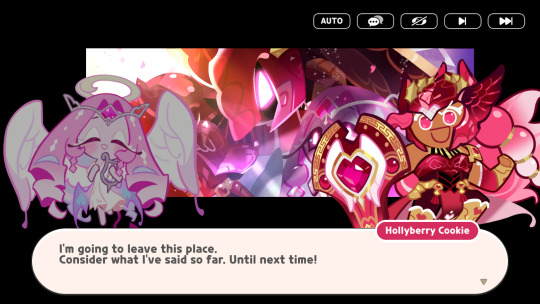
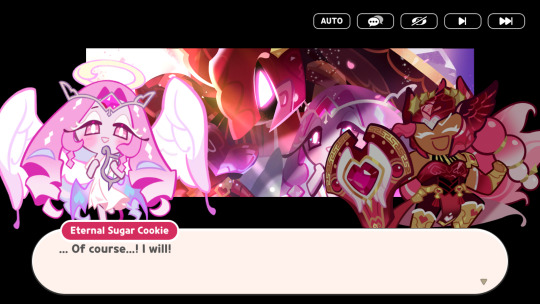
Wedding confirmed, right on time for June too ty devsis!!
Ok ok I jest, still, ppl would argue it's one-sided therefore non canon but I would argue affections being explicitly confirmed in one party is a pretty big deal in of itself. Holly on her part accepted esugar n even agreed to be her other half, now if only esugar agreed to stop trapping ppl in jars.
That said, I'm really hoping players won't go out of their way to scream "fanservice" at the story, I've seen this happen w smilk's update. It's sad seeing fans dismiss good writing as yaoi or yuri bait when the beasts' wish to keep their ancients close play a big role in their characters. That said I don't want non-shipper to feel forced into liking BxA or even admit they're canon, I just want them to leave shippers alone ok since it's clear BxA didn't come outta nowhere, don't dismiss the writing when it's clear the writers DID puts efforts into it.



No more "b-but it make no sense, they only wanted the souljam!" ok it may apply to mflour but esugar does not give a single fuck, she won't take the souljam at least not by force. We have in-game dialogues of her confirming it, I need people to stop saying they only wanted the souljam since that's not only untrue but is an active simplification of their motivations!


About our beast/ancient duo:
A couple of Hollyberry scenes almost make me cry... It's great, it's amazing, beast-yeast partly serve as a revisit to the ancients' characters so having the story digs into her past was everything I needed. Sad dcacao-goldie didn't get the same treatment, we can only hope they get a revisit one day. Dunno if this is controversial but- while the game now confirmed hollyberry does have a drinking problem. I don't want fans to flanderize n make it holly's only trait, we do know she have a problem but we can assume the severity of it does fluctuates, we've seen several instances of holly's drinking n not all of them are shown in a bad light. Compared to, let's say, her Triumph of Sloth costume which arguably is holly at her worst mental-wise n have her dialogues mention drinking several times. In short, I just hope fans would depict these subjects w the nuances they needed. The same thing apply to pv's eating disorder that's, while the game did hint at, is still unconfirmed n only a headcanon as of now. The fandom have a problem with misinformation+taking theory/headcanon as canon in general tbh.
I really enjoyed the revelation about holly's empty heart, the story did touched on the survival-guilt she got after the dark flour war before n I'm so glad it is brought up again. Holly avoiding love in general does track w her attitude toward royal magarine's flirting n her cake hound decor lol. As explained in her awakened's description she cloaked a shield around herself, so much that she didn't noticed the cracks forming within.
Cookie run mostly focused on platonic relationship but this time we got romantic love playing its role as one of the extra themes within the story. Royal berry+jungleberry cookie are one of the few married/explicitly romantic/not one-sided couples within cookie run lore. To get a bit personal here, I find it way too relatable seeing pavlova (being the cookie ver of eros/cupid/romantic love) constantly telling holly she'll be happy once she accepted love into her heart. And the implication that holly is deliberately ignoring the affections of those around her. It's a revelation I find endlessly interesting. Note, despite her Awakening along w accepting pain as something one have to face in life, her "empty heart" has yet to have a 100% resolution. I kinda like how all of the ancients still have unresolved issues despite their Awakening, cacao not yet reuniting w choco, goldie not yet recovering her kingdom, vani and his 99+ problems... And damn what did holly meant by "I've learned from experience"?? My celibate queen who hurt you?...
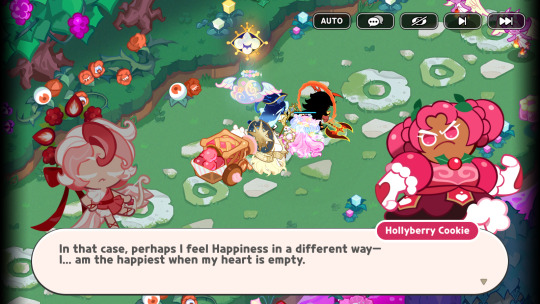

She's just like me fr
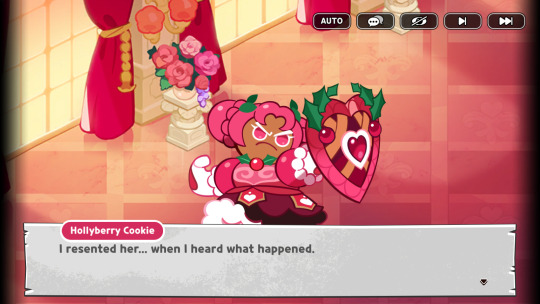
Also, the reveal that hollyberry did resented wl make me tweak. Here we though the ancients sans goldie was too forgiving but turned out the truth is far more complicated. Good stuff. (the gang have no idea how insane I am about this one line)
Weirdly enough I'm not as attached to esugar as I am w the other beasts. Before the update she's my 2nd beast based on design alone but after reading the story, um, she might be my 4th writing-wise. It's a matter of personal opinion, her story is still incredibly well-written all things considered. I just don't vibe w her like I do the rest of the beast ig?? (Current ranking for anyone wondering: 1st mflour; 2nd smilk; 3rd spice; 4th esugar; salt is undecided)
I am thriving so, SO hard w this ep. That scene near the end where we can only hear esugar's voice, the godly choir in the bgm n sugarfly screaming her heart out in terror. Peak, so so PEAK. The "don't leave" scene was sooo fire, someone made a dub compilations of it, my favs are the English n Taiwanese dub. Some of the voice actresses were screaming their lines at the end of it, peak. That one sprite of hers might be the most terrifying thing the artists over at devsis put out yet I need moreeee. Hoping smilk's new sprites (and he WILL get new sprites not even a prophecy we all know he's the game's darling by now-) managed to outdo this cause that one motivated sprite of his doesn't do it for me tbh. The one where he broke his own neck is close but still kinda eh. Do note how exhausted esugar look here.




My preciousss Spice currently hold the "most sprites that give me the heebie-jeebies" award
I'm kinda sad holly's "ancients psycho-analyze the beasts" speech isn't much of a speech but a couple of short revelations. Esugar's wish to grant cookiekind's happiness is genuine, confirmed, she deluded herself into believing hardship is a unnecessary thing in life, confirmed. Ok it's esugar's reaction to the whole ordeal that's interesting to me. Esugar just zeroing on the fact holly came back for her- will she actually consider the words holly said or not place ur bet now everyone. Esugar being a denial queen does tracks w her theme of sloth, it's running away from pain both physical n mental. Pretending everything is fine (webtoon reference)
I like how at the end esugar insists on decorating her garden for when holly returns despite the garden being the problem in the first place. She's so distracted by her own delusions that she can't recognize pavlova's misery despite him standing right beside her. Not story-related, but another aspect of sloth is when one stopped caring about anything around them, esugar display this aspect in the bond costume. Once she achieved everything she wanted, neither cookies' happiness nor the garden is of any concern to her, all she cares about is staying beside her beloved other half. Did I mentioned she wanted holly? Cuz she wanted that cookie baddd. But it's not just that, holly is the representation of passion. Is it by keeping passion locked within her garden that esugar proved her ideology is the right one. That the happiness she has nurtured for so long is "correct."

>About the supporting cast
Pavlova cookie may ended up being my favorite beast follower, ough, but nutmeg tiger... I can't choose... "Sidekick who's done w their boss' shit" is one of my fav archetype. I'm so glad we got pavlova for that, he's what I expected black sapphire to be tbh. Maybe it's cuz he hits my niche but pavlova's story throughout the ep have been one of the most intensive character development we've got for the beast follower trope. I seriously hope we see more of him, his potential are a-plenty, being the only follower so far who's unhappy w his current disposition. (Current ranking: 1st pavlova/nutmeg I can't decide ok; 2nd the deceitlings; 3rd sugarfly; 4th cloud haetae)
We might see more of sugarfly tho, seeing as she'll be returning to the faerie's kingdom. That scene of her breaking off the sugar coating was beautiful, I like how the game presented it. It's not boom she's able to insta fly again, her wings are permanently messed up after not being in use for so long. There's true beauty in that. Both sugarfly and pavlova ended up going through a transformation in the end. To talk about them though, s*garlova eh? Fitting the update of passion gave us 2 peak af ships, but I only like s*galova as one-sided haha... Let's be real here pavlova treated sugarfly pretty bad😭 He spends all of their interactions pilling his work onto her then/and insulting her for being compliant. It's projections n him secretly being mad she's trapped like him, but feelings are not actions, did he ever do or say anything nice directly to her? Idk. Lil guy just have this love/hate envy/admiration mess of emotions toward sugarfly while my girl be out there living her best life. Again, so much potential here, once they met again they'll be at the opposite side of war. What will their interaction be like?
One of the biggest problems cookie run faced is their large cast. With "large" being an understatement... Most of the time the characters aren't utilized well/ ended up being under-used or misused. Ep 5-6 is the best of the best in term of utilizing characters for reasons I'll elaborate on another day. I'm impressed with how the writers managed to juggles so many characters this time around. Rasberry, wild berry etc etc all got their moments. N the illusion at the end left quite an impact despite holly's loved ones appearing for one dialogue box at most. All in all, I'm quite satisfied with how ep 10 turned out despite tiger lily being the only side cookie that got properly explored imo. My only nitpick is I wish the game presented clearer reasons as to *why* the hollyberians wanted to return to the kingdom. Blueberry wanted to leave cuz the place is gross I think? Funniest thing ever.
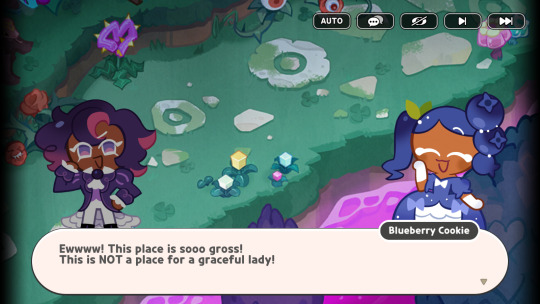
Just for fun: cookie run have a thing for yearner x wanderer dynamics. One will just be out there living their life while the other yearns for them, one tend to have some kind of emotional constipation toward the other, they are hinted to may or may not reunite once again. From the top of my head- lord oyster -> black/white pearl (low-tier since one of them is DEAD), pv -> lily, the blue one-> pv, can apply to all BxA ships tbh, sea fairy -> moonlight cookie (the yearning r heavily implied to be mutual in this case), cotton -> sherbet (the yearnings r also heavily mutual, not as much as seam*on tho), now we got pavlova -> sugarfly (New!)
>About... The Azure one... Actually the smilk cameo wasn't that bad all thing considered. I wish they didn't put him in the title screen though consider he's only in the ep for a single scene, there's some debates on how much smilk's advice played a part in esugar's downfall, but eh. They knew what they were doing putting him there, they managed to pull fans coming in to see smilk so that's a win ig.
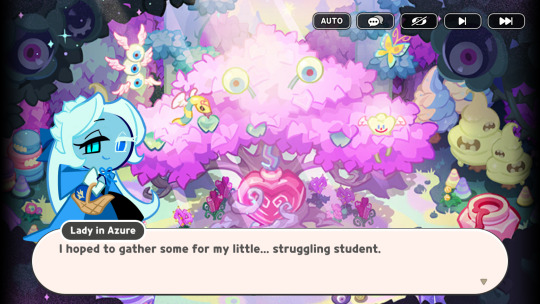
Ok I'm hoping it's not pure vanilla for once c'mon. Might have to do a poll on this...
Anyways, IN STORY BEAST INTERACTION IN STORY BEAST INTERACTION AAAA. This lil scene gave us so much tidbits into esugar/smilk's relationship I love it! Esugar appeared very cautious around smilk, yet she never denied her fellow beast the berries. Smilk once again is scheming sth as smilk do. I won't lie I did miss this casually cackling clown. The passive-aggressiveness, smilk giving advice leaving us to wonder if it's sincere or not. Back when the beasts got revealed fans locked in(tm) n shadow-sugar got the most fanart ship or otherwise. It's still unbelievable to me they're the first beasts duo to get an actual direct interaction in-story. I wonder if it's sth that's added in due to the fandom or sth that the writers already planned n the fans r just that in-tuned. I'm willing to bet the former seeing as the sh*dowsugar fans r not, mm, happy w their canon dynamic. Again the amount of "yuri bait"/"they ruined esugar's character" discourse gave me a headache (I have to emphasize some, only SOME shippers do, all the sane sh*dowsugar fans I wish u a very good day). Gang we all know the beasts mostly don't like each other just by their battle dialogue by now. Everyone, ship what u want, I'm just praying we won't have anymore blowups when it turned out... Idk spice doesn't care for smilk or sth along those lines.
Side note: smilk/lady azure casually brought up killing cookies for fun in that scene, I got told some fans r actually shocked about that?? I'm sorry but did we read the same story😭 that mf killed off a named character in the INTRO of beast-yeast. Attempted to murder cookies, some included KIDS, several times. Scratch that it's not even an attempt, smilk *did* pushed the gingergang off the spire just for giggles bro. Ik the fandom woobified the clown but for some to collectively forget his crime(s) is, wow- even when lady azure is just standing there the writers have to drive home the amount of crimes this mf has committed, every new smilk appearance is a new crime added to the list it's so funny asdfghj
I used the jp voice-over for this update, funfact esugar straight up called him "gross" in the dub. Talking about it though, I'm insane absolutely insaneee about the way the jp voice actress managed to replicate Toriumi-san's speech pattern, even his iconic "KHEHEHE" laugh. Her voice was so amazingly, wonderfully deep n villainous it feel like my beloved Beatrice is back by my side again.
>Other miscellaneous thoughts
-Not ep 10 related but I'm seriously insane about the costume, not only is it yuriful but it's the closest we'll ever get to a "beasts win" AU, one let down is we have no intel on the other beasts since the focus is on these two. The story said holly have no foes to protect the garden from so I'm guessing they left the garden alone or is somehow incapacitated. Some of holly's dialogues are so sad, n looking back it's disturbing how many times she mentioned berry juice, also, "her voice… is my paradise" "my heart feels at peace around… her…" bro, bro? Brooo aa aaah hold me bro ough...
-Alongside happiness n love there's also the theme of parenthood, that scene when tiger lily calms her crying dad by giving him berries.. Can make a grown man cry tbh. We were so close to a family reunion, what a fool I am, for thinking the game might finally resolve a plot thread. Truly we're all fools, gotta wait 5+ more years for it.

-Rip "silent salt is elder faerie" theory it was fun while it lasted (or did it...?) So much details in one image. I'll take whatever ef official art I can get. Interestingly enough ef represented the moon here while the guest resemble the sun w their golden halo. Ef have vines n foliage which is wl's motif not his, the foliage here doesn't resemble the silver tree's branches either. Hm... While the guest have three claw marks ripping them apart. Must this be silent salt? The majority of the fandom agreed so. I'm curious what everyone else's theory is.
#edit later#i'm serious this might be my longest post yet#this is not an analysis but my general impression fyi#there's so much more i wanna add#but the post is getting obnoxiously long as is so i'll leave it at that#i talk about eternalberry a lot ok#crk#cookie run kingdom#1m4 rambles#text#game screenshots#1m4 answer#beast yeast
56 notes
·
View notes
Note
Okay, regarding the ask about necromancy on twst
I think about it a LOT, too much even.
When they talk about necromancy in Disney (in a way that I believe can be connected to twst), I think of some examples. I'm not sure if they're all necessarily necromancy, but they're kind of similar.
The first is Hades, the lord of the underworld and the movie Hercules. It has many references to the dead being brought back and souls, but this has also been used as a reference to overblot and phantoms. And considering book 6, I think it would mention how to bring someone back to life if it were possible.
The second is The Black Cauldron, whose object that gives the film its name has the power of an army of undead which, if I'm not mistaken, is referred to as necromancy. I'm just not sure if twst will continue to use necromancy as a metaphor for blot and phantoms and that this movie will be considered to be used for anything. Maybe there's actually some plot to explain the overblots? I'm not really sure about that one.
Chernabog, who has his demonic/undead servants/slaves. I also have the theory that he is directly linked to blot and overblot, which contributes to my headcannon that twst uses Disney's necromancy as a metaphor for blot in many cases.
And then there's Aladdin's Genie, who is never really made clear whether he can't physically revive the dead or if he doesn't like it because it goes horribly wrong. I not sure but think that if genies exist in TWIST, they would have magic working differently, so Blot and stuff would work differently for them too (if it exist at all). And then there's Nasira, Jafar's sister who is portrayed as being able to summon the dead and is referred to as a necromancer on the wiki. If I'm not mistaken, she's one of the few Disney characters who isn't compared to a deity who does this? I think Najma is inspired by her, so I wonder how interesting it would be if she was a mage with blot-related powers as her unique magic? But Nasira is from a very small game and Najma is an event character, so even if it did happen, which is almost impossible, it's even more impossible for it to be mentioned.
Well, my general theory is that Disney's necromancy is being adapted for Blot in TWST, and I'm looking forward to seeing how this connects to the game's references to death and whatever the hell is going on at this college.
Ignore the mistakes, I should be sleeping, so my head is confused and I'm using a translator)
[Referencing this post!]






I’m not going to be commenting on The Black Cauldron or Chernabog, since neither have lore that has been explicitly referenced or canonized in Twst. I do not want to confuse people by mixing up canon with what is purely fan theory/speculation.
I could be misremembering but 💦 the "Underworld” depicted in Twisted Wonderland isn’t directly associated with death/the souls of the dead like it is in Disney’s Hercules. Tartarus and the general S.T.Y.X. facility hold Phantoms captured for experimentation, including very powerful and ancient ones from the Age of the Gods. The implication may be that these Phantoms are all that remain of the mages that overblotted (ie the original mages are dead now and the Phantoms are all that remain of them), but the Phantoms themselves are not dead. I think the only truly dead one among them is Ortho, whose soul seems to have merged with the Phantoms in Tartarus, perhaps due to having died in this space.
There’s nothing which would indicate it would be possible to bring someone back from the Tartarus shown in Twst. (To begin with, I'm not sure if the Tartarus in S.T.Y.X. and the one in Hercules are one and the same.) The mages associated with each Phantom are no longer around; the Phantoms exist as separate entities that continue to exist long after their mage wiped out. This is also implied by how Idia panics in his post-OB flashback. He acts as though Ortho cannot be returned to him, so it doesn’t appear like reviving someone from the dead is possible. It’s not like Ortho’s spirit is swimming in a soul pool like how it is literally depicted in Hercules. Idia acts like Ortho is GONE gone—and, furthermore, his attempt to “bring Ortho back” by making an artificial intelligence earns him shock and ire from the S.T.Y.X. researchers around him. They behave as though this is wrong or shouldn’t be done, ethically speaking.
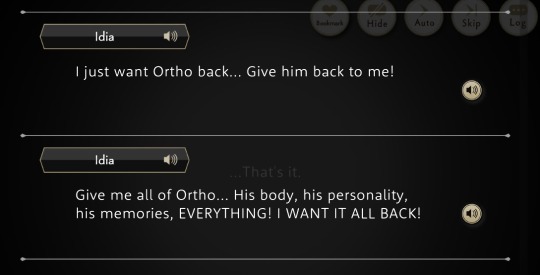
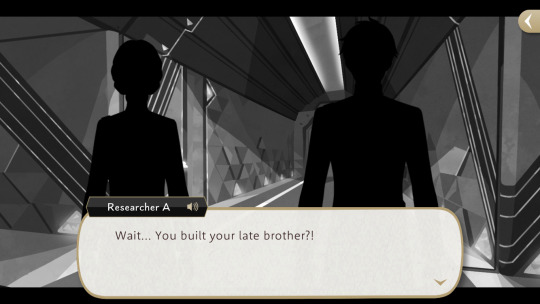
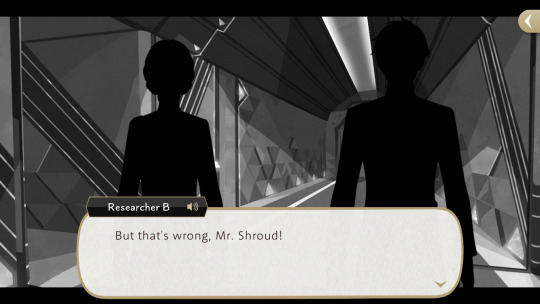
In Aladdin, the Genie states that he “[…] can’t bring people back from the dead. It’s not a pretty picture. I don’t like doing it!!” This implies to me that he technically could perform this magic, but refrains from doing so because the results aren’t desirable. Seeing as he takes on this grotesque appearance when describing the dead, maybe those he revives look… unappealing?? Or somehow are not brought back “whole”/are missing integral parts of their original personalities??
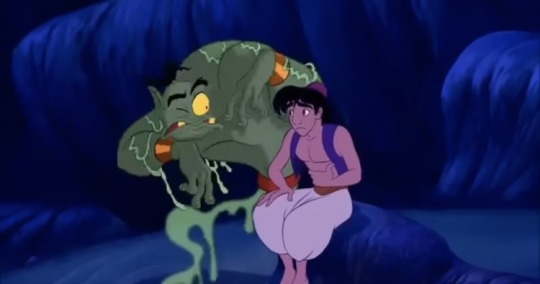
I believe genies are mentioned a few times, mostly by Jamil. For example, he calls Azul his “genie in a lamp” in book 3 and, in one of his Chats, says, “What am I, the genie of the lamp?” He also mentions the three wishes thing and how the Sorcerer of the Sands sought a magic lamp and eventually ascended as a genie himself. But we don’t know how genies work outside of that or how their magic may differ (if at all) from that of a mage. Since Jamil speaks about “the” genie of “the” lamp, it’s possible he is specifically referring to Aladdin’s Genie and thus canonizing the Genie’s rules. In The Return of Jafar, we learn that genie form Jafar is also bound “by the rules of the lamp”, which prevents him from killing others. This is the first of Genie’s rules, so we can assume the other two rules also apply to Jafar + other genies. Not sure if this is also the case for genies in Twst canon, but this might be important to consider.
There’s no official confirmation that Najma is twisted from Nasira (Jafar’s fraternal twin sister), but many fans assume that’s who she must be referencing. It’s not clear whether Najma is a mage or not though. I’d say there’s a chance she could have future appearances 🤷♀️ After all, Kifaji was introduced to us via a hometown event and then became relevant again in book 7.
Really not sure about the blot being related to necromancy thing, especially as it relates to Najma, One’s unique magic is deeply tied to the mage’s identity—and there is nothing about Najma which would suggest to me that she would be invested much in blot or necromancy?? If you stretched it, maybe you could argue she cares about her older brother and becomes interested in alleviating blot to ensure that Jamil isn’t put at risk of OBing again…? But she doesn’t know about that incident at all since Azul stopped it from spreading. It’s also assuming a lot of Najma’s character when we barely know her.
As much fun as it is to theorize about Crowley wanting to collect blot stones to revive the Great Seven/his theoretical dead wife or what have you, I don’t think there’s strong enough evidence to link blot (what is essentially a general magic byproduct) with reviving the dead. It feels like sort of a stretch, especially since blot is shown to be caustic and harmful to living beings, rather than regenerative. No one in the Twst-verse acts as though bringing the dead back is possible, not even the organization that literally researches blot and has access to all of the best technology. (Ortho is a special case and lies outside of the purview of this.)
At the end of book 7, Lilia is able to be brought back from death through (I kid you not) the power of love. Malleus and Silver wished very hard and used the magic in Malleus's broken off horn + Silver's ring to give life back to Lilia. However, everyone being shocked by this indicates to me that it's not a normal occurrence and not something thought to have been possible before.
I’d be willing to consider the theory, but only if there’s something more concrete than largely pulling from Disney films. What is true in a Disney film is not necessarily translated 1:1 or always borrowed in Twst, so I’m wary of just copy pasting lore from Disney over. (Some examples: Ursula has a younger sister but Azul is an only child, iron hurts fae and greatly weakens their magic in Maleficent but fae are not harmed or weakened by iron in Twst; they only find the smell offensive.)
#twisted wonderland#twst#disney twisted wonderland#disney twst#Jamil Viper#Najma Viper#Ortho Shroud#Idia Shroud#Ignihyde#the black cauldron#chernabog#hercules#book 6 spoilers#aladdin#jafar#nesira#the genie#notes from the writing raven#Azul Ashengrotto#book 3 spoilers#book 4 spoilers#the return of jafar#Kifaji#Neji#book 7 spoilers#Dire Crowley#Ursula#Maleficent#Lilia Vanrouge#Malleus Draconia
69 notes
·
View notes
Text
Y'all are driving up a fucking wall with your explicitly non-canon "canon compliant" fics and art. I appreciate them don't get me wrong but can you guys PLEASE for the love of GOD reread the books. Y'all get literally everything wrong 99% of the time please stop calling it canon compliant when that is FACTUALLY INCORRECT


Additional:
> As stated above, He Xuan had NO IDEA about the fate swap until it was leaked to him, and it's heavily implied that this happened VERY RECENTLY prior to the present book timeline. And to go with that, he literally only infiltrated Heaven to investigate Shi Wudu, after becoming a supreme and learning that the random ass guy that showed up when he died was the Water Master. That part is stated by Hua Cheng right at the end of the Black Water Arc.
> He Xuan didn't start denying his and Shi Qingxuan's friendship until BOOK THREE and we know this because of how offended Shi Qingxuan gets when He Xuan immediately says he's not his best friend after Shi Qingxuan suggests that maybe they shouldn't be best friends until he's gotten rid of the Reverend. And based on Shi Qingxuan's reactions to the other denials, it can even be assumed that He Xuan also actively and publicly stated that they were best friends. "Why didn't you say 'my best friend'?" is what Shi Qingxuan says during the game in the run down wind and water temple, for just one example. He's SURPRISED that He Xuan didn't say that, indicating that he would have usually.
> From their very introduction He Xuan is shown throwing himself in harm's way without hesitation to protect Shi Qingxuan. This is how they are introduced to us and it's shown repeatedly all the way through the BWA. And even when he's at his most furious about what happened he's still protecting Shi Qingxuan. He doesn't want SQX to die and he absolutely does not want to kill him himself. Did you guys just forget the part where he doesn't harm people who don't legitimately deserve it???
> He Xuan doesn't just eat any random ghost he comes across. It's explicitly stated that he's only eaten about 500, and about 400 of those have been high ranking water ghosts. Other than that he just eats normal human food.
> There is a barrier around his territory that prevents the majority of vessels from entering. Boats can't just get in there, and he certainly doesn't seek them out.
> Stop making him act and think so fucking violently good LORD. That is legitimately the most incorrect characterization you could possibly have for him where are you GETTING THAT FROM. Him being angry as a result of learning what Shi Wudu did is not his normal personality.
> He does not get powers or memories from ghosts he eats. That is not in the books ANYWHERE. And for the Reverend, that is the ONLY thing he can create and control, and again, he did not get its memories, and even if he did, the Reverend wouldn't know jack shit. Literally the book says he "ate it later" and that's IT. NOTHING else is said about it aside from him being able to control it. There is not even a vague implication that he got anything else from eating that thing.
> YOU PEOPLE ARE DRIVING ME ABSOLUTELY CRAZY again I really do appreciate all the stuff y'all make I REALLY DO but PLEASE. REREAD THE BOOKS AND STOP CALLING ALL THIS SHIT CANON WHEN IT'S NOT, FOR MY SANITY. AUGH
EVERYTHING I've listed and MORE is stated up front in the story. Why is THIS the stuff that almost every beefleaf shipper forgets. It is so very frustrating
Transcript of the images under the cut (images are from book 7 of the seven seas translation btw)
"Mmm, yes... Is something the matter?" Xie Lian asked.
Xie Lian gave a brief account of his service, and the state preceptor replied, "He would definitely be furious with you if he knew about this."
"Gege, regarding the Reverend of Empty Words," Hua Cheng continued, "at first you didn't want to get involved in that case, but you were still pulled in-though thankfully not too deeply. Neither Black Water nor Shi Wudu dragged those hundreds of fishermen into the Heavenly Tribulation in the South Sea. If not those two, who is most capable of something like that?"
Only after each incident had been laid out before him did Xie Lian realize the truth-every step he'd taken since his return had been made under Jun Wu's close watch and guided by his hand.
Hua Cheng crossed his arms. "I'm assuming that he's doing this for two reasons. First, his sick mentality drives him to throw test after test at you to see what path you'll choose-endlessly hoping that you'll go down the one he paved for you. Second, he was probably using you as a sword to cut down other heavenly officials' power.
"The heavenly officials of the previous dynasty must've traumatized him deeply. Now he's hypervigilant and requires absolute control over everything-he tolerates no threats to his power or status and allows no heavenly officials to catch up to him. And I think..."
Xie Lian was also mulling over the same points. "Think what?"
"When Shi Wudu changed Shi Qingxuan's fate, and when Black Water infiltrated the heavens in the name of investigation," Hua Cheng said, "do you really think he didn't suspect a thing?"
Xie Lian had been wondering about that as well. Could Jun Wu really have seen nothing from his seat on the highest throne? That's hardly plausible. He could directly examine every report and scroll that passed through Ling Wen's hands, so was it truly possible that he never noticed the forgeries? The Water Master committed such a heinous crime and deceived nearly the entire world, but he lived peacefully for many years. He was conveniently only exposed when he started dominating the Upper Court.
"Perhaps he knew everything from the very start, but the Water Master didn't threaten his status back then. So he made no move to expose him," Hua Cheng continued. "Exposing the matter early on wouldn't have necessarily worked to his advantage. A new Water Master would ascend if Shi Wudu was banished, and they might not have such an enormous transgression that could be used against them. I'd have been very displeased with Shi Wudu if I were Jun Wu, but I wouldn't have needed to use my own hands if I wanted to get rid of him-all I'd need to do was wait. I would simply watch quietly as the Water Master grew more and more outrageous, arrogant, and fearless, and when he finally exhausted my tolerance, I'd just leak the fate-switching affair to Black Water."
And Black Water would of course avenge himself and his deceased family.
Hua Cheng continued to explain, "As for him gathering millions of ghosts in the Kiln to birth a new supreme, it was likely in order to..."
Xie Lian came to his senses and finished for him. "...Create balance."
"Yeah," Hua Cheng said. "He was probably delighted to welcome the birth of a malicious supreme, one that would cause havoc in the Mortal Realm. As long as there are creatures making trouble, there will be people praying."
And a god's spiritual power was only made stronger by the prayers of their devotees!
63 notes
·
View notes
Text
silent salt and elder faerie theory + analysis!!

I recently found out I wasn’t the first one who thought of the theory (regarding my first post)

But this is good bc means i can get to see other opinions to write this post! (Which means most of my Media was taken out of Reddit and Twitter!)
okay,,, <- she writes this right after writing a long aah ramble about a cookie game, proceed with caution aware of spoilers and intense info dumping and yapping
from a character arc perspective, it builds on strong thematic symmetry lore, just like other beasts have their symmetry with the ancients; as White Lily transforms into Dark Enchantress Cookie, betraying the Ancients, Silent Salt’s potential betrayal of the other Beasts (by orchestrating their sealing) would mirror that fall…. from solidarity to silence (ha! Foreshadowing???)

Both arcs would center on moral compromise and emotional rupture, adding weight to their potential bond. This could even imply a dual fall-from-grace motif driving their relationship and future conflict🤓🤓
okay onto a small detail about the tree where elder faerie cookie “sealed the beasts”
Using structuralist narrative theory, the events and causality must remain internally consistent. Silent Salt is explicitly shown to be sealed in the tree alongside the other Beasts.

where. is. silent salt/white lily’s. souljam???????
Now this places a hard limit on where and when he can act: IF Elder Faerie is Silent Salt, the theory requires time travel or a retroactive manipulation of the timeline,,
Silent Salt would have had to escape the seal, live as Elder Faerie, and then return to be resealed?? Or did he pretended to be sealed in first place??? and always knew how to escape to live as Elder Faerie, hMMMM??
This contradicts key canon imagery tho—specifically, the confirmation of Silent Salt’s presence within the seal during the moment it cracks the tree
For the theory to hold, we’d have to assume Silent Salt escapes, becomes Elder Faerie, and returns to the past to become the version of Silent Salt that is sealed again. This would require a closed temporal loop, which, while possible in speculative fiction, lacks any textual setup FOR NOW. I mean time travel still not real so anyone can interpret however they like!
The idea of the temporal loop could be also very interesting to apply in this context, I mean, the only way to break is if someone else is add into the narrative of going to the past and future; leading to White Lily receiving her awaken form or we getting Dark Enchantress Cookie in Gacha (freaking finally)
but back to the time travel:
the use of time travel in this universe is not without precedent. Characters like Croissant Cookie, Timekeeper Cookie and Twizzly Gummy Cookie provide textual proof that temporal distortion is a narrative tool available in the Cookie Run universe. May I add that we have diverse forms of the fantasy world; example is that awhile we have ancients look like lands, we have cookie playing guitar and using guns, while other stick to canons and arrows, other wear atl and meanwhile we have princess and armors
However, these events are clearly established within their respective storylines. In contrast, there is no indication that the Beasts’ storyline—particularly regarding Elder Faerie or Silent Salt—is meant to explore time travel 👁️👁️💔
Attempts to parallel this with the Pure Vanilla/Shadow Milk Cookie paradox from Episode 7 further demonstrate the narrative inconsistency to the time travel theory: while the PV/SM duality might imply some temporal fluidity, most evidence suggests metaphorical language or magical echoes rather than literal time travel,,
The most substantial evidence that might support time travel—or at least temporal overlap,, comes from the Fortune Teller Cookie aka Corrupted PV twist. His appearance before PV’s corruption introduces a paradox. However, the Fortune Teller’s ambiguous motivations and identity suggest alternative explanations, such as magical echoing, foreshadowing, or even psychological projection, rather than true temporal displacement ☝🏻☝🏻 like freud’s point on copying mechanisms ig
Shadow Milk’s domain being a place where “time and space are malleable” does offer a backdoor for time manipulation, but this hasn’t been concretely tied to the Elder Faerie/Silent Salt plot, so,, yk? We may get this better in Episode 11-12: STILL,,, If anything, this paradox demonstrates the story’s preference for metaphysical ambiguity over hard sci-fi time loops. Thus, while this subplot may flirt with time distortion, it does not justify applying the same logic to the Elder Faerie theory
Instead of reading the story literally, a metaphorical reading may better support the Elder Faerie = Silent Salt theory, such as for the design of them:
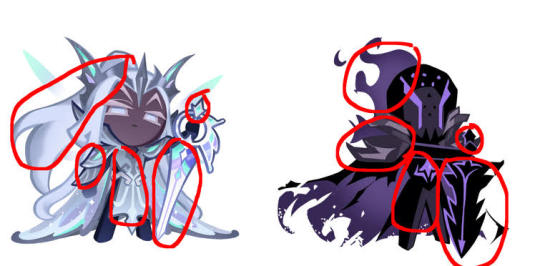
i do see resemblances, I mean, sword, the armor and colors… they are quite similar and there’s the plus where this still is just his silhouette, so maybe when we see him fully under the game we could see more 🤷♀️

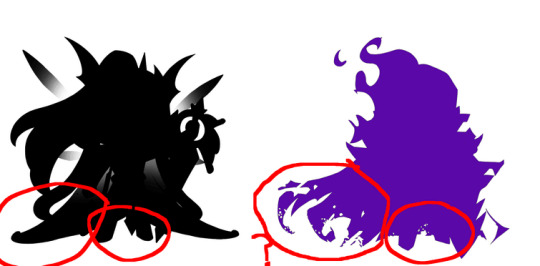
Elder Faerie guarding the tree might symbolize internal conflict—a being caught between loyalty to old companions and duty to the present
The armor, the silence, and the absence of a revealed face all reinforce themes of hidden identity, emotional repression, and guilt🧐
This reading aligns with the suggestion that Silent Salt was never corrupted—he chose silence as a punishment or mourning for his betrayal,,, This leads to the name SILENT Salt being literal 🗣️🗣️ Like he made a vow or smth to keep all under the rug (well, this case its a tree) And such a choice may not have required a full transformation into a separate persona (Elder Faerie), but instead signals that he and Elder Faerie are complementary echoes of the same internal struggle,,
so this is how it lead me to use my thoughts with philosophy from freud into them
Silent Salt could represents the superego—the internalized moral law, manifesting as silence, guilt, and a rejection of desire (solidarity turned into isolation);
Elder Faerie, on the other hand, represents the ego attempting to maintain order, stability, and function in the world, all while bearing the repressed trauma of having betrayed the other Beasts.
Under this framework, Elder Faerie is not literally Silent Salt,, but the embodied conscience of him, a protective mechanism for the unbearable weight of past decisions…. This repression also explains the absence of a clear motive or memory trail; the metaphor lies in the fracturing of the self under the burden of betrayal
exploring the concept of the "banality of evil" (by hannah arendt), arguing that catastrophic moral failure often stems not from monstrous intent, but from thoughtless conformity, bureaucratic detachment, and the refusal to take personal responsibility:
In the metaphorical interpretation, Silent Salt’s act of sealing the Beasts was not malicious but necessary- yet it still required betrayal If Silent Salt chose to bear this alone;
Or maybe Silent Salt noticed he didn’t knew why he was like that with other beasts and simply locked them away to stop madness;
Still both leads to in silence, his transformation into a masked, mute guardian like Elder Faerie becomes symbolic of the concept, he surrenders speech and identity, withdrawing from the public world as a penance for having made a decision he knew would destroy not only his friends but himself.

Where there is encouragement to thinking as resistance to evil, Silent Salt chooses silence as self-punishment—an inversion that shows the emotional toll of responsibility. Elder Faerie, then, is not just a new form, but a living monument to moral compromise.
The obscured face of Silent Salt can be seen as literalizing the Jungian Shadow—what is hidden is feared
Elder Faerie, guarding the tree (a symbol of sealed knowledge or forbidden truths), becomes the ego’s effort to guard society (and the self) from confronting that dark truth. Silent Salt's silence is not weakness, but a protective barrier against the collapse of self. To truly reveal Silent Salt’s face (his identity) is to face the guilt of the past…. Until the story reaches this point of confrontation, the narrative resists giving us that catharsis, which reflects the Jungian idea that integration of the Shadow must come through voluntary recognition or maybe through white lily’s awaken fo—🔫🔫 *GUNSHOTS*
the two characters are existentially split, not literally. Elder Faerie is the self that functions; Silent Salt is the self that remembers. The narrative tension may not be about time travel or chronology—it’s about authenticity, and what happens when a being refuses to integrate all parts of who they are,, the idea that despair is the refusal to be oneself (just like white lily/dark enchantress cookie)

All of those parallels has its at odds with established lore,, Silent Salt could be presented as have never been corrupted, which complicates the idea of him undergoing a transformation akin to White Lily’s,, BUT this could bring his manipulative side of being “just like White Lily” when in reality is a lie and he choose the path instead of being forced into it🤔 smth like that “rooted in duty rather than delusion”
in this theory, the parallel between Silent Salt and White Lily doesn’t collapse under lore—it becomes more sinister. It’s not a mirror of shared tragedy. It’s a distortion, a manipulation—
what if Silent Salt wasn’t the noble martyr he (tried to) portrays himself to be—but rather, someone who betrayed the other beasts out of cold conviction, not reluctant necessity? UNLIKE White Lily, whose descent was emotional and chaotic, his “silence” could be the product of strategic manipulation.
This opens the possibility that his supposed purity is a narrative mask, much like his literal armor: He hides behind an image of stoic sacrifice, not to protect others, but to control the narrative—and perhaps even to weaponize his resemblance to White Lily in manipulating her. This would mark a powerful inversion: while White Lily succumbed to corruption, Silent Salt could have embraced betrayal with clarity, not madness. The story then becomes less about shared tragedy and more about a false equivalence: he claims to be “just like her” in order to exploit her, but in truth, he was never a victim of circumstance—he chose this path….

Thus, his silence is no longer merely a sorrowful symbol of sacrifice, but a deliberate obfuscation, a self-imposed myth used to justify or conceal his betrayal. “Rooted in duty rather than delusion” becomes a dangerous rationalization, not a virtue—an echo of authoritarian reasoning cloaked in self-pity🫢🫢🫢
In this light, the parallel between “banality of evil” once again
like it was all planned (mastermind type of shit yk? you do get it-)
this is all i can think off… you are free to go, poor soul🕊️🕊️ i kept u long enough for a crazy aah theory ramble
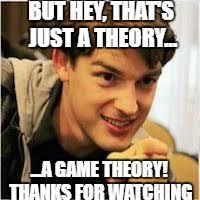
#barbs' rambles ── .♡#elder fairy cookie#elder faerie cookie#silent salt cookie#white lily cookie#cookie run kingdom
38 notes
·
View notes
Note
Jae-Hyun owes me $26. (That's the last time I let him borrow money) If anyone asks, my level of obsession interest in 14DWY is FINE and NORMAL. This is most certainly not the 3rd separate ask I've submitted, because that would be excessive. I am a fine and normal person and would never do that. In an older post, you discussed some of the head canons you have and some of Ren/[Redacted]'s past and interests. Will any of these show up in-game? Thanks Saint!
⌞♥⌝ Since they're all headcanons (and I don't like overtly spoiling stuff), you can assume that some of those dot points will be referenced in the game in some way! Whether it be through reading between the lines, mentioned briefly through the dialogue, shown in the background, explicitly mentioned by a character, etc.
I think I've mentioned this before, but Ren's "red room" days, the cannibal scene, and a few others will all be dependent on the choices the player makes in the game. Right now, there's quite literally nothing (since we're only in Day 4 and the game is still in its cutesy, cliche VN phase.)
Also... Ren hasn't revealed his true nature yet fkjsdgh), but as more Days get released, the themes will get darker!!
182 notes
·
View notes
Text
actually, silver's time traveling DID make sense... until sonic forces - an analysis
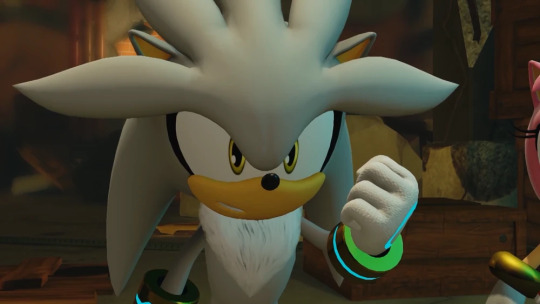
hello! this is a follow-up to my previous analysis post i made about why silver's time traveling is so weird.
everything i said in that post still applies, but upon looking at things closer (and creating an entire timeline map), i came to the realization that sonic forces actually kind of singlehandedly ruined everything. but hey what's new amiright
in all seriousness though, creating this timeline map helped me better visualize just what the hell is going on with silver's time traveling and various futures, and i hope it's able to do the same for you all as well! (full analysis under the cut)
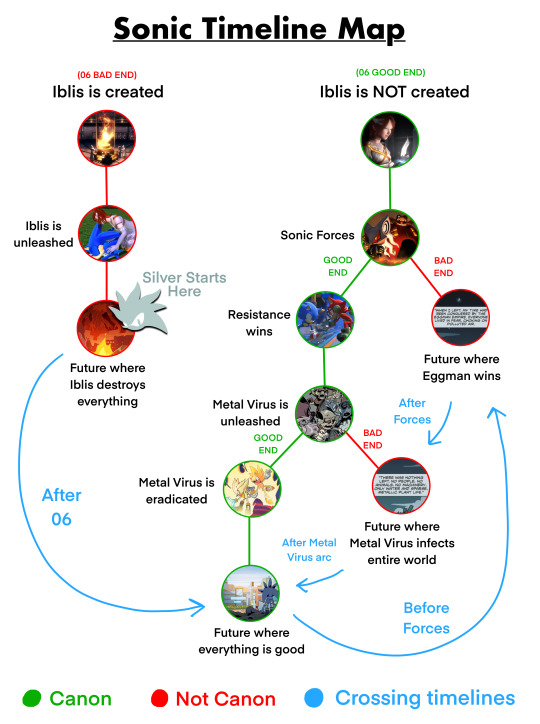
FULL BREAKDOWN:
EDIT: i sort of forgot to take into account that sonic rivals and especially sonic rivals 2 DO seem to imply that silver's future is currently bad, though it's not stated outright. 06 also IMPLIES that silver's future is good at the end but it's not actually stated/shown to be the case. so in that case, it'd be future is still bad after 06 -> thus future is bad in rivals 1+2 -> rivals 2's resolution causes the good future mentioned in sonic colors ds. even in this scenario, it'd still be forces' fault for making the future bad again, but it wasn't AS crystal clear before forces as i may have originally made it seem like in this post. live and learn lol
so, let me explain what all this means lol (using different versions of this map)
silver is born into a timeline that's basically the bad ending of sonic 06 - where sonic is killed, elise cries, and iblis is unleashed, destroying the world. this is where silver starts:
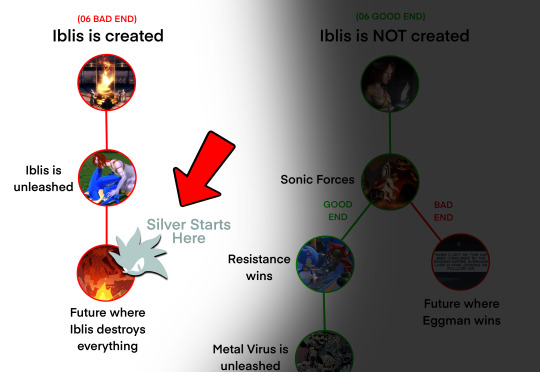
the events of sonic 06 create a new timeline where solaris is never split into iblis and mephiles. thus iblis is never created and never destroys the world, causing silver to return to a future where everything is good.
silver starts in the 06 bad ending timeline, but he returns to the future of the new 06 good ending timeline, AKA the canon timeline:
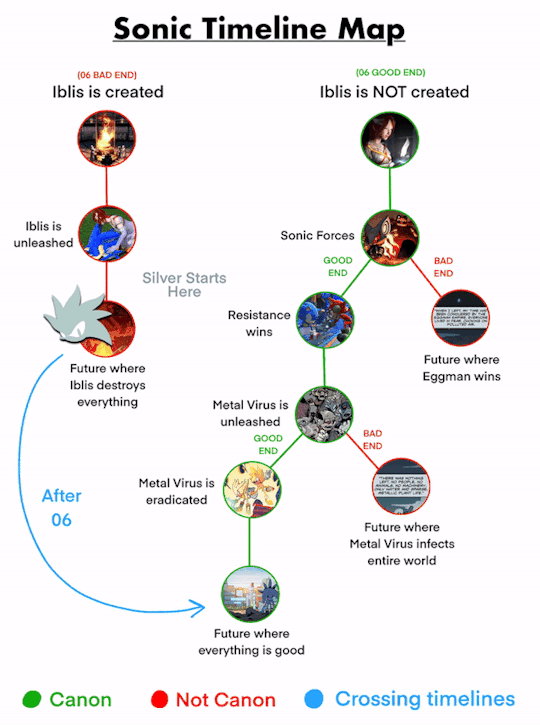
(please excuse my shitty gifs lol)
this is where he remained for a WHILE, and where he should have remained. in all games between 06 and forces, the status of silver's future is either not mentioned, or is explicitly stated to be the good future. (specifically in colors ds)
so for a while, it was pretty simple and actually made sense. silver went from the 06 bad ending timeline, to the 06 good (canon) ending timeline, and then stayed there ever since. everything was fine. we could've just left it like this.
but then, sonic GOD DAMN forces decided to mess ALL THIS UP.
because when silver shows up for the events of forces, it's because his future... is taken over and polluted by eggman. as a result of forces. which doesn't make sense ANY way you cut it.
whether silver lived in a timeline where forces ended good or bad, EITHER WAY the events of sonic forces HAVE ALREADY HAPPENED. THEY SHOULD NOT CAUSE SILVER'S FUTURE TO ACTIVELY CHANGE BEFORE HIS EYES. THAT'S NOT HOW TIME WORKS
so because of forces, we then get this incredibly weird jump where silver LEAVES the canon good future... and goes to a random non-canon, bad ending timeline. for some reason:
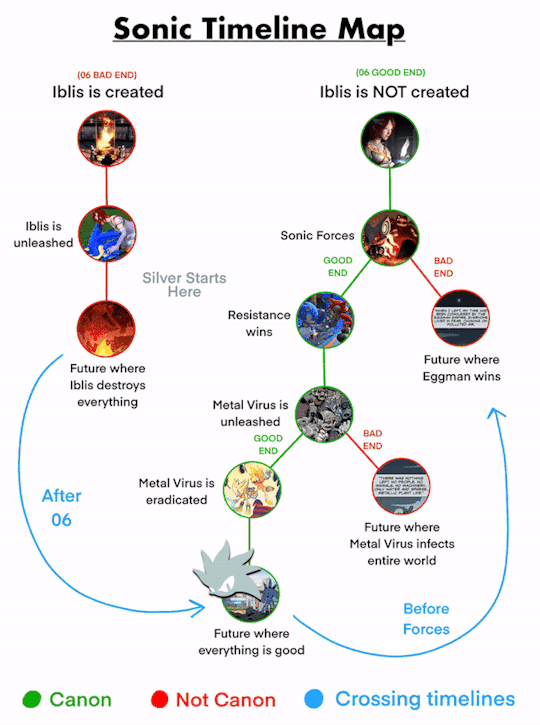
from there, it's a bit more straight-forward. sonic forces happens and when silver goes back to his future, it's no longer the bad ending of forces, but the bad ending of the metal virus arc:
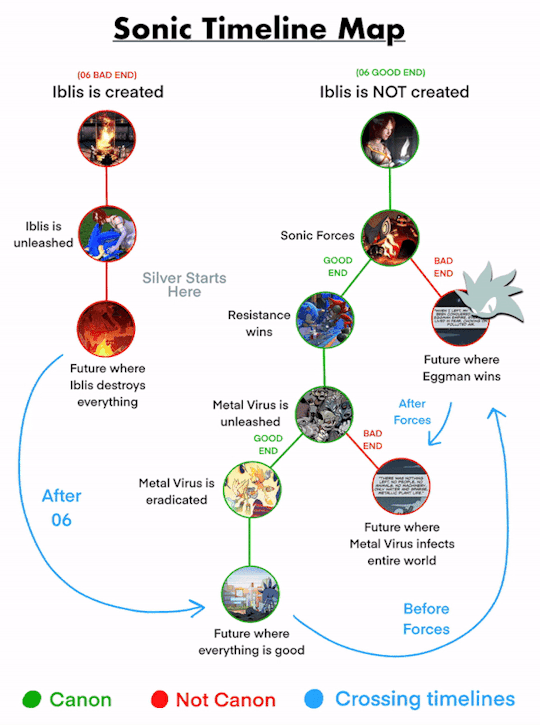
thus, silver goes back to the present to help stop that. the metal virus is eradicated, and we are EXPLICITLY shown that this is what directly causes silver's future to be saved:
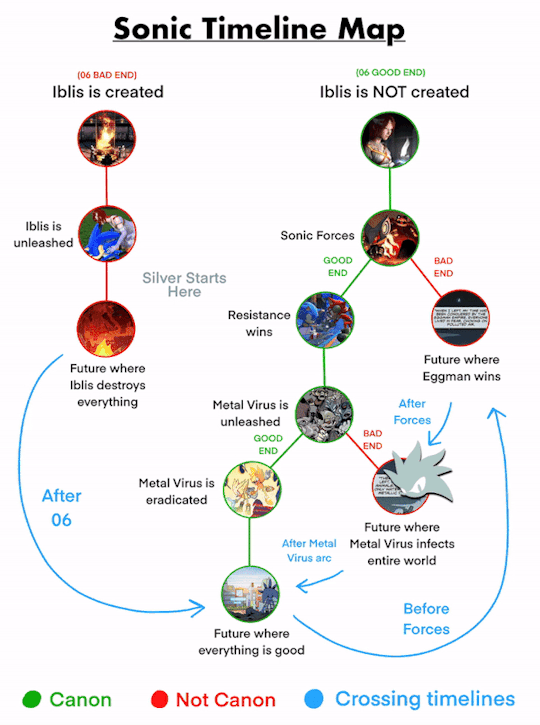
and for now that hasn't changed. (and god willing, it never will)
ever since the end of the metal virus arc, silver's future is a good one and he's just been hanging out in the present, freaking out about not having a purpose anymore.
the literal SINGLE problem with all this is that silver was IN the good future before, but got yoinked OUT of it for some reason.
if after 06, he hadn't returned to a good future, but rather the bad ending future of sonic forces, then that would have made sense! that's the next point in the timeline where things can split off.
he fixes one problem, but it doesn't save the future. now the future is just ruined by something else. so then he has to go fix the next problem, and then the next, etc. etc.
that would've, y'know, made sense.
but you wanna know what's even more aggravating? they could've STILL done what they did with forces without changing silver's future!
it would've been so easy to have silver, in his good future, realize (through history books or something) that there is a point in the past where eggman almost fully takes over, and decide to time travel back to that point to make sure that things go as they're supposed to.
that would've made so much more sense! this goes back to the quirk of silver's time traveling that i pointed out in my first post, which is that silver tends to time travel to change the future, rather than make sure that the future happens the way it should (like a lot of other time travel stories do)
at this point however, silver's future IS capable of somehow changing at will. and i think there's really only two options to fix this.
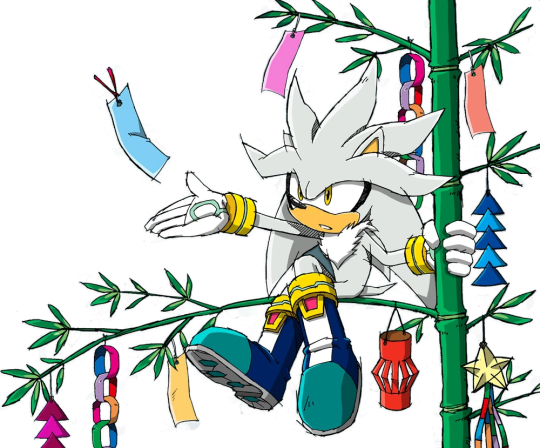
the first and easiest is to just retcon stuff. either retcon silver's good future after 06, or retcon the forces + idw stuff about his future changing. this would be the simplest option i think.
the other is to try and come up with an explanation for silver being plucked out of his good future and shoved into other bad ending futures. i think it IS possible but it would still be incredibly convoluted.
i think you could spin it so rather than the good future becoming bad, it's actually just silver specifically as a person being transported from the good future to the bad future timeline. as to why, maybe whatever force sends him to time travel wants to... show him the consequences of that "canon event" getting messed up?
like, he's supposed to make sure that things go as they should for their good future to exist. and in order to make him understand why he needs to do this, he's like - shown a vision of what could happen if he doesn't? by him being transported to that bad ending timeline?
in all honesty, i really don't see a clean, easy way of explaining everything in one neat little package without retconning anything.
either things get way more convoluted and stupid, or things get retconned. and i dont know about you, but i would much rather take the latter. even if retcons can be frustrating, i feel like it's way better than the alternative.
but idk, what do you think? did any of this make sense? i hope it did. i quite like my silly little map.
anyways that's all for now bye <3
(bonus: here's the original version of the timeline map that i doodled in my notebook lol)
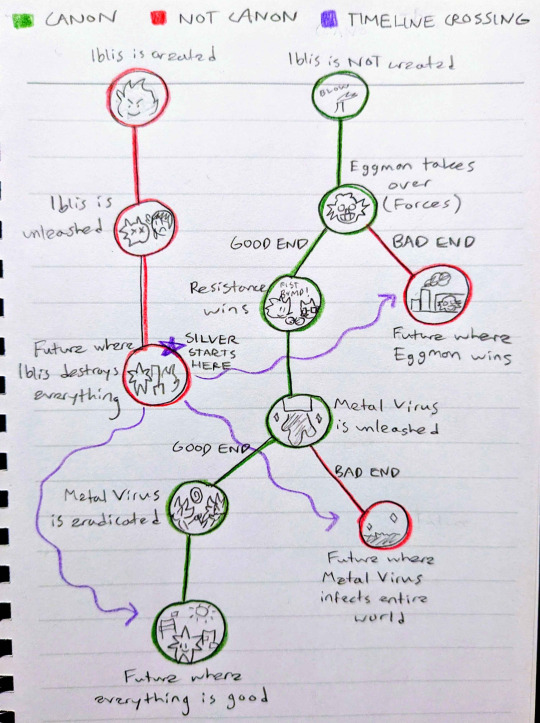
#sth#sonic the hedgehog#silver the hedgehog#analysis#sonic 06#sonic forces#sonic idw#infizero.txt#infizero.analysis
66 notes
·
View notes
Note
Jason told. Gimme headcanon pls. (Sexuality, gender, the whole shabang)
Jason is a third gen dominican inmigrant on both his parents' sides and Catherine was ethiopian while Willis was congolese.Him being so eager to find his 'real mom' in Ethiopia was motivated by diaspora kid trauma and Los Padres Todd were a mixed bag to refrain the demonization of poor people yet also give a good insight on intergenerational trauma in latino/black/afrolatino families.Jason is darkskinned with 4d textured hair,a big beautiful nose,full lips and fat.Chunky Robin!Jason is so fitting and cute and so is him with natural hair to reference his canon curls and Red Hood!Jason goes through a variety of dread styles with that single white loc eternally there
Jason is transmasc agender and butch.His egg cracked so early he dosen't even remember thinking he was a girl or rather a binary cis girl-He lowkey identifies as partially a girl in a nonbinary/genderqueer kinda way so he loves being called girl-adjacent and hates when he's lumped in with cis men in gender as he feels no connection in traditional maleness.I fw with the 'The Lazarus Pit gave Jason a testosterone boost' theory and it applies to his post-ressurection ego boost too as the gender euphoria kicked in.And killed and maimed and tortured and other kinds of violence.I don't support Jason's wrongs and i'm glad he got over himself and embraced losercore and anarchism.He uses he/they/xe pronouns and Eddie was his first boycrush as he's bidemi so really his childhood boy best friend is the only option(looking at you,'Jason's bi awakening was an older man' crowd......he's not THAT kind of fatherless and your imaginary incestcapades are a sign of your racism issues,not 'daddy' issues).Scruffy Jason is the best Jason
Never beating the triple A i.e audhd, autism and anxiety and cluster b allegations,specifically bpd,npd and bipolar disorder(his ptsd is explicitly implied/shown).His special interests are classical literature,theater,gothic subculture,dogs and video games,neapolitan flavoured things are his main safe food,his emotional regulation problems and nonexistent masking game date back to basically birth,he picks his fits based on a mix of personal style and whichever gives him the best sensory feels,he was bullied at school ever since his school career started and it demotivated him from going to college or taking online classes to catch up on high school even further and he's a multitype otherkin:Ghost,border collie and vampire bat.Almost forgot but he pretty obviously has psychosis and he's been getting called the p slur so long and so often he dosen't even blink but depending on who it is,he might jump whoever is saying it
Hot black anime nerd alert!!He grew up reading the Bleach manga and Ichigo Kurosaki is his ultimate comfort character thanks to how similar they are and he owns a bunch of volumes and merch and his ideal woman is an afrolatina version of Orihime Inoue.Other JT childhood classics include Devilman,Doraemon,Soul Eater,Fullmetal Alchemist,Yu Yu Hakusho and Tengen Toppa Gurren Lagann and he vaguely sorta remembers Naruto but tapped out at the Sasunaru fujofest he saw in the fandom due to finding it horribly mid.He dosen't care for shoujo too much except Magical Girls and his favorite MG series is Ojamajo Doremi and he refuses to associate himself with any of the orientalist incel parts of otaku subculture
Duke and Jason are eachother's Robin.Fullstop,no cap,segregators shut your performative asses the fuck up.Jason could never love any nonblack guy as much as he loves Duke and Duke deserved to be as much of a kid as the other Batboys and Robins so he's The Outlaws' Robin and was adopted by Bruce beforehand so he's unambigiously a Batboy too.Duke got a year in as Batman's Robin but got into a disagreement with Bruce that scared him shitless as he thought he was gonna be fired as Robin like Stephanie and his twelve year old orphaned mind couldn't handle it so he ran away in the dead of night with a supersized back of supplies given to him by a certain semi-kryptonian and was found as the sun rose by twenty year old Jason as the opener to Volume Two of Red Hood and The Outlaws,ran from two thousand ten to two thousand twenty.Duke was caring for a family of fat calico cats in an alley he'd snuck into and Jason took him to The Fortress,The Outlaws' base,upon discussing the circumstances with him.Duke quickly intigrated into the team and fit right in,including with the other Kid Outlaws and Jason gave him the nickname Sun Pocket as a pun on his powers and pocketable size.Rhato takes place over three years and the gang disbands not on any beef but simply needing to take different paths to live to the fullest and none of them ever loose contact forever and after sorting some stuff out,they manage to reunite all together bi-monthly.I picture Jason and Duke reuniting when Duke is sixteen a week shy of seventeen and a bit stressed out and Jason's covered in scars inspo'd by Juni Ba's version of him so he holds concerns Duke will be offput by his new apperance or worse not even recognize him but the second he sees him again,his eyes blow open in shock and it wares off in a few seconds as he bolts towards him with a huge smile on his face and a golden opalesent streak behind him and crashes him into a hug while yelling out his name and Jason reflectively opens up his arms to him before he even processes the situation.Duke excitedly introduces Jason to his hero squad aka The Lights and insists they go to Batburger to get Batmeals for old times sake and Jason refuses to let himself do more than tear up over how much he missed him in public to save face but he can tell anyway and feels happy over it
Talia is Jason's adoptive mom,don't @ me with any anti Talia shit or Talia erasure,she's objectively extremely good and deserves better just like Duke and so does Damian.They were intergenerational close friends in his Robin days so in Lost Days,they upgraded to considering one another mother and son and Damian came to be completely consensually with no dubcon retcons and just Brutalia angst ft.Bruce knowing he has a bioson by Talia and not allowed to meet him for the safety's sake and it killing him he couldn't raise his boy yet also feeling grateful he at least got to have one of the best mom's anyone could ever ask for.Jason babysat baby/toddler!Damian and Damian didn't see Jason again until he was ten with him and Duke two years apart in age and hitting it off on first meeting,although for clarification they met when Duke returned to Gotham to attend high school at fifteen and Jason was gone because he was on his Red Hood arc.Since Talia is a palestinian-chinese,her and Jason did and do cultural bonding,sharing and fusion/blending and he calls her Mamí and Duke is on it too as he adresses her as Auntie and views her as a reliable older woman in his life who's not quite a mom but definitely family and them and Damian are the Traffic Light Siblings.Talia also earns Lexcorp into her own hands by turning it into a solarpunk international company and renames it Taliacorp
Bro is ALT alt,not a poser watered down thirst trap.He's a mix of afropunk and afrogoth and dresses and lives accordingly and listens to a wide genre of punk and goth music and adds bits of personalization to everything he owns and makes.He does taxidermy,attends mosh pits and Duke introduced him to them so they're very personal to him,vandalizes public property,hangs out at macabe and creepy places,does corpse paint and elaborate edgy nail art,finds the interplay of blood and romance hot as fuck,is obsessed with indie horror games,hates Hot Topic and wants Tim Burton lynched.He resents the stereotypes about alternative subcultures and debunks misinfo about alts through his actions and teaches about them too whenever prompted
Yes i'm a believer in Jason and Stephanie parallels and found siblings bestieisms but please see the purpose of this isn't to deplore Stephanie's arc,it's to explore a fun and complex platonic m/f relathionship and give Stephanie nice things,okay?Jason's not the woobie Batfanon stans paint him as but he's not a heartless traumaless monster either and there's interesting bits to him and Stephanie that work in both their favors.Once they start interacting by comics standard plots and lighthearted shenanigans,they quite like eachother in a hesistant way due to their many differences but find common grounds enough to form a real bond.Stephanie is black too(jamaican/south korean)so it influences the developments and the final product and Jason got Stephanie's back and Stephanie dosen't coddle Jason and they love Duke so fucking much and share so many black inside jokes and do hair and skincare together and celebrating juneteenth is their version of christmas
Fuck ya 'Wonder Woman fanboy Jason' white feminism,Starfire fanboy Jason is infinitely better in-character🙄 Pre-Robin Jason was an og Kory stan and Robin!Jason damn near fainted in black boy joy overload when he met her in New Teen Titans.Kory found it so endearing and flattering and brought him along on adventures with her and Jason was in the waiting room the day Mar'i was born and sobbed his heart out over his first of many to come precious niece.Kory owns a casette tape Jason made her briefly pre-Ditf and held it as a keepsake of grief until his return and she made him a casette tape too so they'd come full circle
Idc who you ship him with,he's poc4poc and hates men as a social class.Rose and Artemis are god-tier Jason love interests and afrolatino4mestizo Jaykyle is the only valid Jaykyle
And as a little treat,a Jason moodboard coming at you pookie /pos








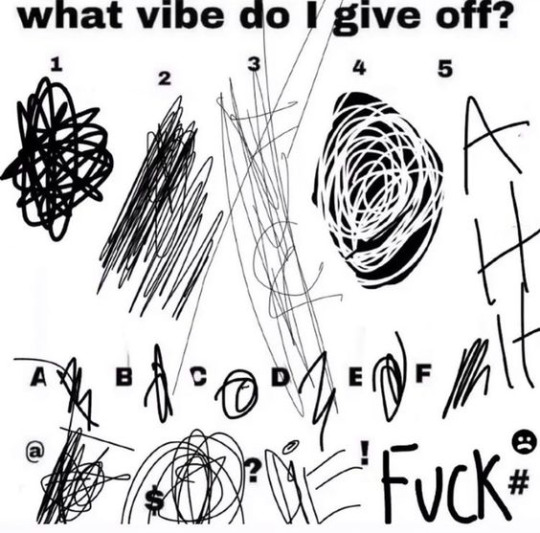
#anonom#jason todd#afrolatino jason supremacy#autistic jason todd#trans jason todd#goth punk jason todd#dadhood#my bird boy#los todds#duke thomas#outlaw!duke#talia al-ghul#damian wayne#good mom talia al-ghul#arab damian wayne#chinese damian wayne#stephanie brown#koriand'r#nell little#blasian stephanie brown#batfam#rhato#the outlaws#dead sidekicks force#all new teen titans#eddie bloomberg#jayrose#jaytemis#💌#askies
28 notes
·
View notes
Text
Yeah I'm gonna talk about the Andor rape scene.
First, disclaimer, I don't watch Andor, or any Disney Star Wars show. I did watch Rogue One, and it's probably the best thing Disney Star Wars ever did, which isn't saying much. So if you want to dismiss what I'm saying because I didn't see the scene and don't have the "context" or whatever, go fuck yourself because the only context I need is that there's now a rape scene in Star Wars.
Which is bad. It's stupid and retarded and it changes Star Wars forever for the worse. Star Wars isn't Game of Thrones. It isn't a dark, gritty, realistic portrayal of war and tyranny. It's a space opera, and while some space operas do "go there" with regards to rape and graphic content, it's not required, nor is it the norm. Star Wars was one of the space operas that didn't go there. It never needed to. You understood that the Empire was evil because Darth Vader was torturing people and they blew up an entire planet. The empire were the bad guys and the good guys were defined by standing up to the Empire. And even with that simplistic concept, the movies were still good. No one went to see Star Wars and thought "well, Vietnam just happened so I don't really think I can believe this portrayal of war unless some villages get napalmed and some women get raped". They said "oh wow Luke Skywalker is awesome he blew up the Death Star!" or "laser swords? Awesome!"
The idea that everything needs to reflect reality is such a braindead concept, but I'm not surprised that's the defense the showrunner is going with. Everyone involved with Disney Star Wars at every level has shown that they don't understand Star Wars at all. Not from a storytelling or character standpoint, or a meta, cultural standpoint either. "It's for kids" is never an excuse for bad or lazy writing, but it is a reason why explicit scenes aren't included. For decades, the most explicitly violent thing in Star Wars was Ponda Baba's arm getting cut off in the Mos Eisley cantina. That happened within the first half of the first movie, and the series never felt the need to try and top that because explicit content was never the point of Star Wars. It never needed to resort to cheap emotional ploys to get you to feel for the characters. Which brings me to my next point:
Aside from stories about rape, rape is never necessary in fiction. In fact, I say 95% of the time it's a crutch bad writers use because that's the only way they know to evoke a visceral emotional reaction. It's lazy and uninspired. It lowers the quality of whatever it's in. If you can't get someone to hate your villain without making them a rapist, then you're a bad writer. But this rape scene in particular is actually damaging to the original trilogy (as so much of Disney Star Wars is). Because the explanation is that you can't have a story about war and resistance without rape. Which means that the Empire is now known to have rapists in its ranks. Andor takes place in the same timeframe as the OT, which means that the same Empire that tried to rape that woman is the same empire that had Princess Leia captive on the Death Star for at least a few days. Do you see where I'm going with this? If your assertion is that rape must exist in the Empire to portray war and resistance accurately, then Princess Leia had to have been raped while in captivity, because the same Empire that captured this woman also captured her. But that never happened. We know that never happened because it was never so much as hinted at. She was tortured for information, but she was never raped. No female captive in the entire Star Wars saga, both the real Lucas stories and the fake Disney "canon", was ever raped. So by the directors own reasoning, the only Star Wars property to ever portray a realistic (where "realistic" is seen as good and "unrealistic" is seen as bad) version or war is season 2 of Andor. Which is massively insulting to every other Star Wars movie and show ever made. Even The Acolyte, which is objective trash, doesn't deserve to be implicitly slighted because it didn't depict rape. Star Wars is not about reflecting reality. It's about the fight between good vs evil. It's about family and belonging and standing up for what's right. Universal concepts that anyone can understand even if it's nothing like what you read about in the news everyday. And that's what it should always be.
Goddamn I hate that Star Wars is being ruined like this. I hate it so much.
51 notes
·
View notes
Text
So WFA introduced War Games in their backstory... (I'm not really a fan tbh)
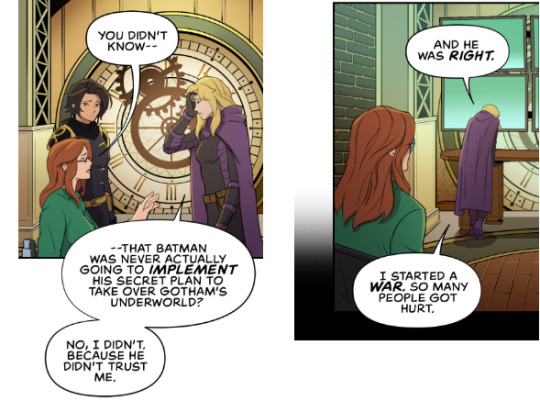
Source: Wayne Family Adventures #158
Okay so I just made a post about falling off WFA, but I went and had a quick look at how its going and saw that they've acknowledge War Games as part of WFA canon... and I'm not really a fan of that.
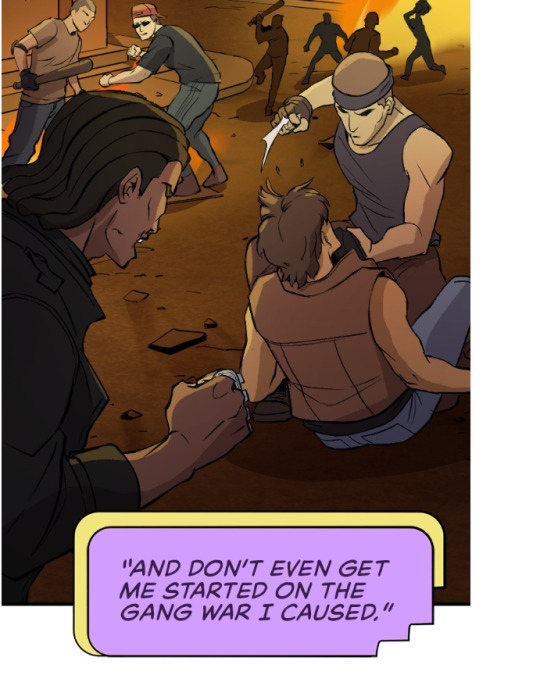
I am admittedly still steadily learning more about comics and working my way through them, but as I understand that whole storyline (Steph becoming Robin, getting fired, and starting a gang war) was all an event which existed just to kill her off, and so did her really dirty.
So having this explicitly be shown to take place in the WFA continuity kinda further clashes with more lighthearted vibe of early WFA (something I complained about in my initial post) but also kinda does Steph dirty once more by having her have been astoundingly incompetent despite her experience.
I recall reading Batgirl 2009 a bit back and the whole War Games fiasco felt like something they danced around, for understandable reasons given how it wrote Steph.
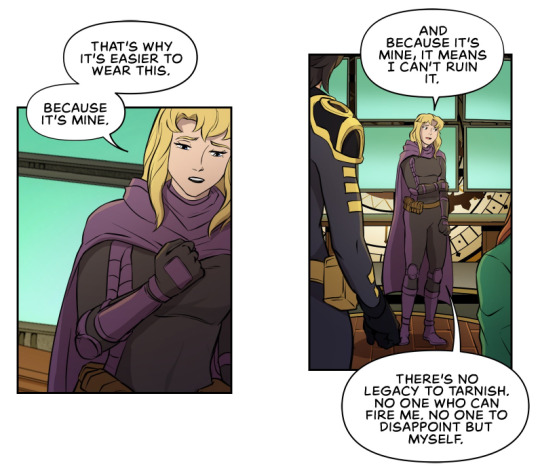
Also am not sure how I feel about the idea that Steph returned to being the Spoiler out of insecurity of being worthy of the Batgirl mantle. Partially out of personal preference (since I just really like the Spoiler) but still...
I guess it just feels a bit odd, since if the events of Batgirl 2009 (or similar) happened, then it arguably feels a bit regressive in Steph's development for her to stop being Batgirl because she thinks herself too much of a screw-up or disappointment for it.
Plus Stephanie Brown is a character I really associate with Independence; she created the Spoiler to save herself and her mother because no one else would, and I think there's a lot of meaning behind that to the point where there's legitimate reasons for Steph to revert to being Spoiler again which don't involve her being "unworthy" of legacy mantles.
Maybe I'm off-based in my perception, but that's my rambling thoughts anyway.
#dc comics#professoruber thoughts#batgirl#spoilers#the spoiler#wayne family adventures#wayne family adventures season 3#batman: wayne family adventures#wfa#wfa criticism#stephanie brown#cassandra cain#cassandra wayne#barbara gordon#oracle#war games#batman war games#wfa spoilers
35 notes
·
View notes